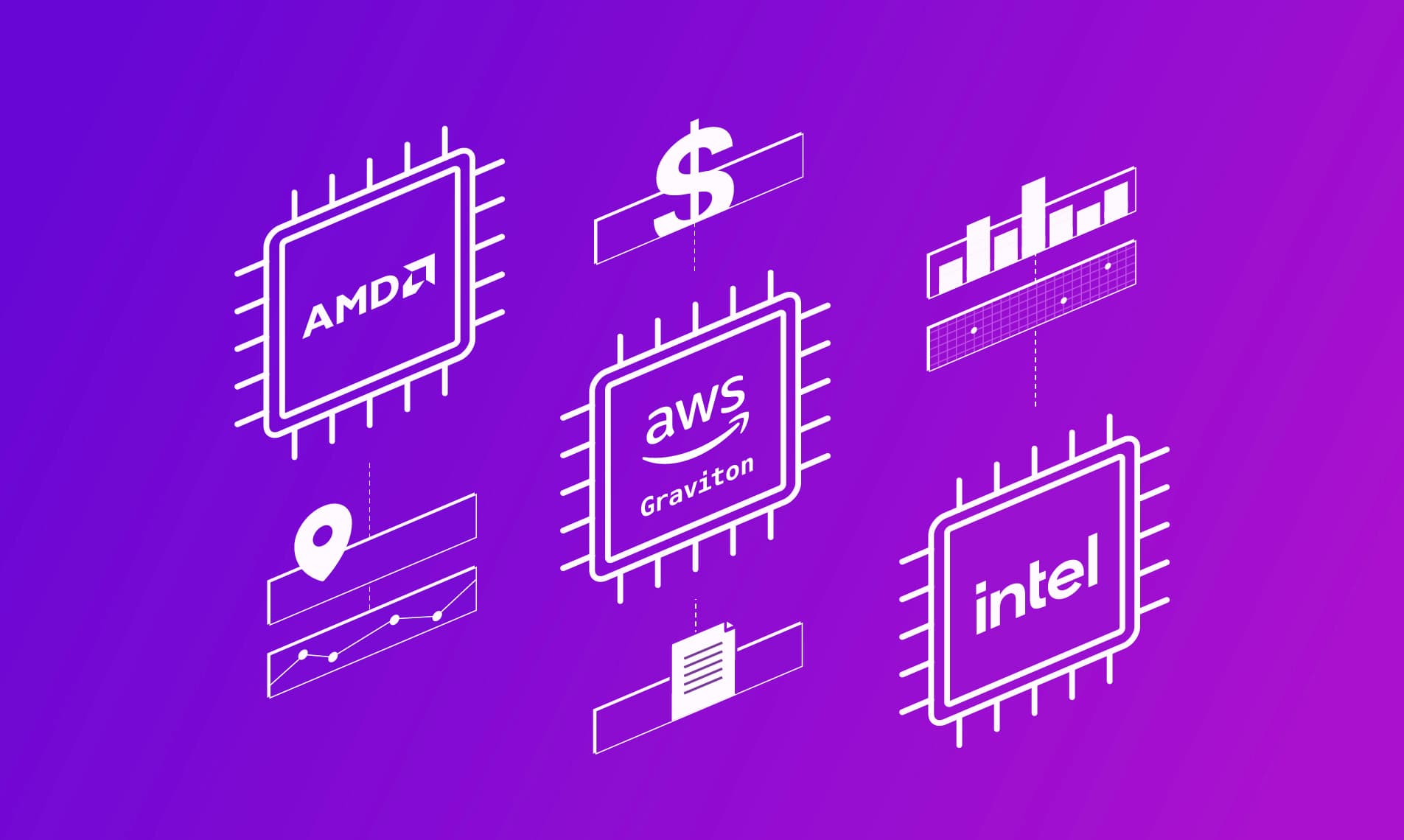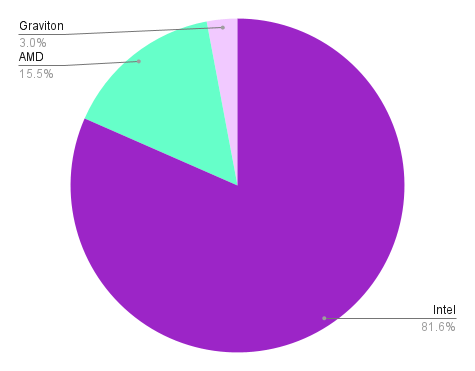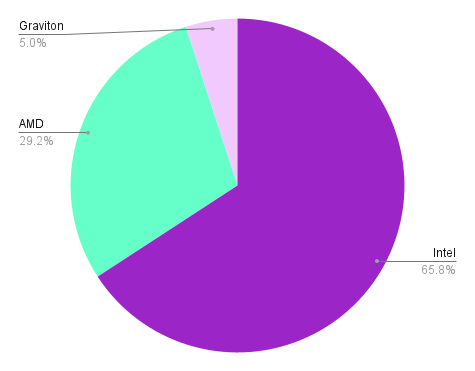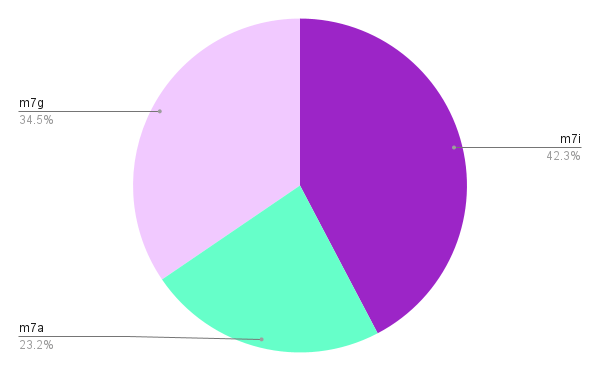Intel vs AMD vs Graviton: Amazon EC2 Processor Differences and Distribution
As Graviton and AMD processors gain broader EC2 availability alongside Intel, we analyze factors such as performance, cost, and distribution.

2006 marked the release of the first EC2 instance, m1.small—with just 1 vCPU and 1.7 GiB of memory. It, along with the next several generations of EC2 instances, all had Intel processors. In 2018, AMD-powered instances came along with the release of the 1st generation AMD EPYC processors. Also in 2018, AWS released its own processor, Graviton, that advertised to have up to 40% better price performance for certain instances.
A customer's choice of EC2 instance largely depends on its processor, as it affects performance, cost, software compatibility, and more. Even with the introduction of two more processors and the improvements across generations of processors and instances, Intel remains the most used processor on EC2. However, Graviton and AMD adoption is growing.
Differences Between Intel, AMD, and Graviton
Intel, AMD, and Graviton each come with tradeoffs:
-
CPU Architecture: Intel and AMD have x86-based architecture, while Graviton has 64-bit Arm Neoverse cores. The architecture affects software compatibility and performance. Arm-based architecture, in particular, has potential compatibility issues with certain software that may not be supported or may require refactoring. A common reason in the past not to use Graviton was vendor lock-in, as Arm is not as widely supported, which is still true, however, Azure and Google (as of this month) both now have Arm processors available.
-
Threading: Intel and AMD support simultaneous multithreading, enabling "multiple threads to run concurrently on a single CPU core." Graviton, on the other hand, does not, and every vCPU is a physical core. Some workloads, like data analytics, are more efficient on a multithreaded workload, whereas others, such as gaming, perform better on single-threaded workloads. Note—you can disable multithreading by setting one thread per core.
-
Price Performance: Graviton is advertised by AWS to have better price performance, in some cases up to 40%, than comparable Intel and AMD instances. Independent benchmarks comparing similar instances, such as this one by Scylla, also find Graviton to be more price-performant. This is due in part to Arm-based processors having lower power consumption and more competitive margins since Graviton is owned by Amazon. Graviton is an excellent choice for those who are prioritizing cost.
-
Performance: Benchmarks show various results since performance is so specific to use cases. As such, if you're choosing between instances, consider running your workload on different instances to compare.
It's also worth considering that new and improved instance types with new generations of processors are frequently introduced. See the next section for a list of all current instances and which processors they have.
Intel, AMD, and Graviton Processors by EC2 Instance
As a recap of EC2 naming conventions, by looking at the instance you can always tell the family and generation. For example, M5 belongs to the general-purpose m family and is in the 5th generation. For some of the EC2 instances, such as M7g, you can infer the processor as well (g for Graviton), for others you can't, which is why we put together the following table of current EC2 instances and their processor information:
Table of EC2 instances processors (scroll to see full table)
There are about three times as many families with Intel processors than with AMD or Graviton.
Distribution of Intel, AMD, and Graviton for EC2 Instances
As we saw above, just about every new generation of EC2 instance has instances with AMD and Graviton processors, and each processor has its own advantages. So it should come as no surprise that the adoption of these instance types is growing.
Vantage is a cloud cost and optimization platform that has a unique look into industry spending patterns due to anonymized customer data. We've previously been monitoring the changes in the EC2 processor landscape and other topics in our Cloud Cost Reports.
The following pie charts represent a comparison of spend between Intel, AMD, and Graviton for EC2 instances based on the percentage of total customer spend for Q1 2023 and Q1 2024, respectively:


As you can see, the percentage share of AMD and Graviton costs compared to Intel has nearly doubled in the past year. However, this does not show the full story. For starters, Intel is the processor of many more instance types than AMD and Graviton. There are also differences in how they are priced. For example, the most expensive Graviton-based instance is $5.821 On-Demand per hour, whereas AMD's is $98.320, and Intel's is $218.40.
Looking at this pie chart for the most recent generation of the m family, we can see a more evenly distributed percentage of spend:

EC2 M7 instances processor distribution, Q1 2024
The distribution reflects customer consideration of selecting an instance type based on their workload.
Conclusion
EC2 is the number one AWS service in terms of cost, which provides a strong incentive for processor manufacturers to compete for customers' workloads. As the data shows, while Intel still holds the majority share of the EC2 landscape, the adoption of AMD and Graviton instances is steadily increasing, reflecting customer willingness to consider alternative processor architectures based on their specific workload requirements.
Sign up for a free trial.
Get started with tracking your cloud costs.


